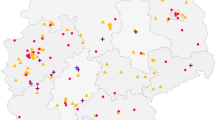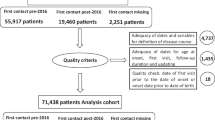Abstract
The long disease duration of multiple sclerosis and the increasing therapeutic options require a individualized therapeutic approach which should be carefully documented over years of observation. To switch from MS documentation to an innovative MS management, new computer- and internet-based tools could be implemented as we could demonstrate with the novel computer-based patient management system “multiple sclerosis management system 3D” (MSDS 3D). MSDS 3D allows documentation and management of visit schedules and mandatory examinations via defined study modules by integration of data input from various sources (patients, attending physicians and MS nurses). It provides forms for the documentation of patient visits as well as clinical and diagnostic findings. Information can be collected via interactive touch screens. Specific modules allow the management of highly efficacious treatments as natalizumab or fingolimod. MSDS can be used to transfer the documented data to databases as, e.g. the registry of the German MS society or REGIMS. MSDS has already been implemented successfully in clinical practice and is currently being evaluated in a multicenter setting. High-quality management and documentation are crucial for improvements in clinical practice and research work.



Similar content being viewed by others
References
Berger JR, Centonze D, Comi G, Confavreux C, Cutter G, Giovannoni G, Gold R, Hartung HP, Lublin F, Miravalle A, Montalban X, O’Connor P, Olsson T, Polman CH, Stuve O, Wolinsky JS, Ziemssen T (2010) Considerations on discontinuing natalizumab for the treatment of multiple sclerosis. Ann Neurol 68(3):409–411
Compston A, Coles A (2002) Multiple sclerosis. Lancet 359(9313):1221–1231
Confavreux C, Paty DW (1995) Current status of computerization of multiple sclerosis clinical data for research in Europe and North America: the EDMUS/MS-COSTAR connection. European database for multiple sclerosis. Multiple sclerosis-computed stored ambulatory record. Neurology 45(3 Pt 1):573–576
Evans C, Tam J, Kingwell E, Oger J, Tremlett H (2012) Long-term persistence with the immunomodulatory drugs for multiple sclerosis: a retrospective database study. Clin Ther 34(2):341–350
Flachenecker P, Zettl UK, Gotze U, Haas J, Schimrigk S, Elias W, Pette M, Eulitz M, Hennig M, Bertram J, Hollweck R, Neiss A, Daumer M, Pitschnau-Michel D, Rieckmann P (2005) MS registry in Germany—design and first results of the pilot phase. Der Nervenarzt 76(8):967–975
Fugger L, Friese MA, Bell JI (2009) From genes to function: the next challenge to understanding multiple sclerosis. Nat Rev Immunol 9(6):408–417
Gasperini C, Ruggieri S, Mancinelli CR, Pozzilli C (2013) Advances in the treatment of relapsing-remitting multiple sclerosis—critical appraisal of fingolimod. Ther Clin Risk Manag 9:73–85
Giovannoni G, Kinkel P, Vartanian T (2007) Treating multiple sclerosis in the natalizumab era: risks, benefits, clinical decision making, and a comparison between North American and European Union practices. Rev Neurol Dis 4(4):184–193
Haase R, Schultheiss T, Kempcke R, Thomas K, Ziemssen T (2012) Use and acceptance of electronic communication by patients with multiple sclerosis: a multicenter questionnaire study. J Med Internet Res 14(5):e135
Haase R, Schultheiss T, Kempcke R, Thomas K, Ziemssen T (2013) Modern communication technology skills of patients with multiple sclerosis. Mult Scler [Epub ahead of print]
Kempcke R, Schultheiss T, Kratzsch F, Eulitz M, Reichmann H, Ziemssen T (2012a) Modern therapy management for the improvement of the therapy with interferon beta-1b with MSDS 3D. Aktuelle Neurol 39:S2–S5
Kempcke R, Schultheiss T, Ziemssen T (2012b) Advances in MS patient management: update of Multiple Sclerosis Documentation System ‘MSDS 3D’. Eur J Neurol 19:710
Kratzsch F, Eulitz M, Kempcke R, Lorz A, Meissner K, Ziemssen T (2009) Development of the multidimensional (physician, nurse, patient) multiple sclerosis documentation system “MSDS 3D”. Mult Scler 15(9):S55–S55
Lugaresi A, Ziemssen T, Oreja-Guevara C, Thomas D, Verdun E (2012) Improving patient-physician dialog: commentary on the results of the MS Choices survey. Patient Prefer Adherence 6:143–152
MacLean R (2004) The challenge of managing patients with multiple sclerosis. Nurs Times 100(4):42–44
Pette M, Eulitz M (2002) The Multiple sclerosis documentation system MSDS. Discussion of a documentation standard for multiple sclerosis. Der Nervenarzt 73(2):144–148
Pette M, Zettl UK (2002) The use of multiple sclerosis databases at neurological university hospitals in Germany. Mult Scler 8(3):265–267
Schultheiss T, Kempcke R, Kratzsch F, Eulitz M, Pette M, Reichmann H, Ziemssen T (2012a) Multiple sclerosis management system 3D. Moving from documentation towards management of patients. Der Nervenarzt 83(4):450–457
Schultheiss T, Kempcke R, Ziemssen T (2012b) Innovative management of MS patients on natalizumab using MSDS 3D software. J Neurol 259:S109
Sobek S, Kempcke R, Ziemssen T, Schultheiss T (2012) Impact of fampridine on fatigue, depression and cognition in multiple sclerosis. Eur J Neurol 19:354
Trapp BD, Peterson J, Ransohoff RM, Rudick R, Mork S, Bo L (1998) Axonal transection in the lesions of multiple sclerosis. N Engl J Med 338(5):278–285
Whitaker JN, Mitchell GW, Cutter GR (1995) Clinical outcomes and documentation of partial beneficial effects of immunotherapy for multiple sclerosis. Ann Neurol 37(1):5–6
Ziemssen T (2009) Multiple sclerosis beyond EDSS: depression and fatigue. J Neurol Sci 277(Suppl 1):S37–S41
Ziemssen T (2011) Symptom management in patients with multiple sclerosis. J Neurol Sci 311(S1):S48–S52
Ziemssen T, Kratzsch F, Eulitz M, Kempcke R, Kleiner N (2010a) Development and first evaluation of the new patient management and documentation system MSDS 3D for patients with multiple sclerosis. Neurology 74(9):A554
Ziemssen T, Kratzsch F, Kempcke R (2010b) Patient management of MS patients on natalizumab therapy with MSDS 3D. Nervenheilkunde 29:S31–S33
Ziemssen T, van Lokven T, Kempcke R, Meergans M (2012a) Study design and first results of a non-interventional registry study to establish long-term safety and pharmaco-economic data on fingolimod (Gilenya (R)) in multiple sclerosis patients in Germany (PANGAEA). J Neurol 259:S72
Ziemssen T, van Lokven T, Kempke R, Meergans M (2012b) Study design and first results of a non-interventional registry study to establish long-term safety and pharmaco-economic data on fingolimod (Gilenya (R)) in multiple sclerosis patients in Germany (PANGAEA). Neurology 78:A332
Ziemssen T, van Lokven T, Ortler S, Meergans M (2012c) Changes in current evaluation of new drugs needs survey of pharma-economic data: treatment satisfaction of fingolimod (Gilenya) in comparison to first-line-therapeutics in multiple sclerosis patients (PANGAEA and PEARL). Aktuelle Neurol 39(7):385
Author information
Authors and Affiliations
Corresponding author
Additional information
Contact details: Information about the MSDS system is available on http://msdsweb.med.tu-dresden.de.
Rights and permissions
About this article
Cite this article
Ziemssen, T., Kempcke, R., Eulitz, M. et al. Multiple sclerosis documentation system (MSDS): moving from documentation to management of MS patients. J Neural Transm 120 (Suppl 1), 61–66 (2013). https://doi.org/10.1007/s00702-013-1041-x
Received:
Accepted:
Published:
Issue Date:
DOI: https://doi.org/10.1007/s00702-013-1041-x




